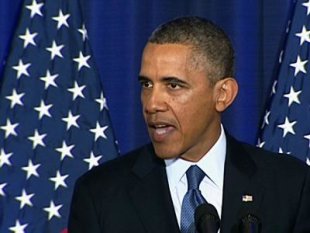 President Barack Obama defends his use of drones. (Pablo Martinez Monsivais/AP)Saying it's time "to fight terrorists without keeping America on a perpetual wartime footing," President Barack Obama invited Congress in a speech on Thursday to help him scale back the country's 12-year conflict against al-Qaida and its affiliates.
President Barack Obama defends his use of drones. (Pablo Martinez Monsivais/AP)Saying it's time "to fight terrorists without keeping America on a perpetual wartime footing," President Barack Obama invited Congress in a speech on Thursday to help him scale back the country's 12-year conflict against al-Qaida and its affiliates.
"America is at a crossroads. We must define the nature and scope of this struggle, or else it will define us," he warned in remarks at National Defense University.
Obama defiantly defended his use of drones to assassinate suspected extremists overseas, including Americans, but he asked lawmakers to join him in setting modest new safeguards. He renewed his call for shuttering the Guantanamo Bay prison for alleged terrorists. And he announced efforts to find a better balance between investigations of national security leaks and the freedom of the press.
"Our systematic effort to dismantle terrorist organizations must continue. But this war, like all wars, must end," Obama said in a speech plainly shaped by his awareness of the place drones and Guantanamo Bay could occupy in his legacy.
"Unless we discipline our thinking, our definitions, our actions, we may be drawn into more wars we don?t need to fight, or continue to grant presidents unbound powers more suited for traditional armed conflicts between nation-states," he warned.
Obama was heckled at length by Medea Benjamin, co-founder of the anti-war group Code Pink and a leading (and highly recognizable) critic of the so-called war on terrorism.
"Can you tell the Muslim people their lives are as precious as our lives?" she shouted as she was finally ushered from the hall. "Will you apologize to the thousands of Muslims that you have killed? Will you compensate the innocent family victims? That will make us safer!"
After trying and failing several times to get her to sit quietly, Obama went off script and enlisted her protest to reinforce his message about the need to close the Guantanamo facility.
"The voice of that woman is worth paying attention to," the president said, to applause. "Obviously, I do not agree with much of what she said. And obviously she wasn?t listening to me and much of what I said. But these are tough issues. And the suggestion that we can gloss over them is wrong."
Here are some major points from his address:
= On drones
Obama offered an unapologetic defense of his use of drones, saying they are legal, generally moral and a last resort for getting terrorists when capture is out of the question, sending in American special forces is impossible and a local government cannot?or will not?act. "These strikes have saved lives," he said.
At the same time, he acknowledged that civilian casualties can serve as a powerful recruiting tool for terrorist groups.
He warned against the temptation to see drone strikes as "a cure-all for terrorism" and invited Congress to help him set modest new safeguards, perhaps like setting up a new court that would vet potential targets or erecting an independent body inside the executive branch to do so.
He also had a message to those who, like Republican Sen. Rand Paul of Kentucky, have warned against using drones at home.
"For the record, I do not believe it would be constitutional for the government to target and kill any U.S. citizen?with a drone or with a shotgun?without due process," Obama said. "Nor should any president deploy armed drones over U.S. soil."
(Paul was underwhelmed. "I'm glad the President finally acknowledged that American citizens deserve some form of due process," Paul said. "But I still have concerns over whether flash cards and PowerPoint presentations represent due process; my preference would be to try accused U.S. citizens for treason in a court of law.")
Obama did not directly challenge critics who have noted that the White House has redefined ?imminent threat? to the point of meaninglessness. A Justice Department memo, revealed in February, declares that "'imminent? threat of violent attack against the United States ... does not require clear evidence that a specific attack on U.S. persons and interests will take place in the immediate future.?
Nor did he address a May 2012 New York Times report that the administration minimizes civilian casualties by counting "all military-age males in a strike zone as combatants."
"What's needed on drones is not a 'kill court' but rejection of the radical redefinition of 'imminence' used to expand who can be killed as well as independent investigations of alleged extrajudicial executions and remedy for victims," Zeke Johnson, director of Amnesty International USA?s Security with Human Rights Campaign, said in a statement.
= On Guantanamo Bay
Obama called on Congress to lift restrictions on transferring detainees that the Pentagon has cleared for release back to their home countries?"Release them today!" Benjamin shouted?and said he was ending the moratorium on sending about 50 Yemenis home. U.S. officials have long considered Yemen a hot spot for reradicalization.
Obama said he was appointing senior officials at the State Department and the Pentagon to oversee the process.
He said some of the 166 Guantanamo detainees would be tried either in civilian courts or by military commissions, noting there was no reason not to hold them in prisons on American soil. Dozens of other terror suspects have been tried, convicted and jailed in the U.S., he said.
Obama acknowledged the most daunting obstacle to closing Guantanamo Bay is what to do with about 80 prisoners that his administration has decided cannot be tried in court and are too dangerous to be released. And he offered no concrete solution.
"But once we commit to a process of closing GTMO, I am confident that this legacy problem can be resolved, consistent with our commitment to the rule of law," the president said.
Republicans immediately denounced the plan. ?The president?s speech today will be viewed by terrorists as a victory," said Sen. Saxby Chambliss of Georgia, the top GOP lawmaker on the Senate Intelligence Committee. To keep suspected terrorists from attacking Americans in the future, Chambliss said, "GTMO must stay open for business."
It was unclear how Obama would overcome bipartisan objections to closing Guantanamo Bay. The first lawmaker to deal a major blow to Obama's promise to close the facility was a Democrat, then-House Appropriations Committee Chairman Dave Obey. And with the campaign ahead of the 2014 midterms already heating up, vulnerable Democrats may not rush to support the president's approach.
= On the scope of the global war on terrorism
Obama?s remarks came as key lawmakers have begun debating whether to revise and update the post-9/11 law that underpins most of the so-called war on terrorism, legislation known as the Authorization for Use of Military Force, or AUMF. Critics worry the executive branch has interpreted the AUMF as a blank check for a global campaign over which lawmakers have only limited oversight.
"The AUMF is now nearly twelve years old," Obama said. Deadly attacks on the American compound in Benghazi, Libya, and the Boston Marathon show terrorists still hope to kill Americans, but the Afghanistan war is winding down and central al-Qaida "is a shell of its former self."
"I will not sign laws designed to expand this mandate further," he said. "We must define our effort not as a boundless ?global war on terror??but rather as a series of persistent, targeted efforts to dismantle specific networks of violent extremists that threaten America."
Obama's comments came one week after Assistant Secretary of Defense for Special Operations and Low-Intensity Conflict Michael Sheehan told the Senate Armed Services Committee in a May 16 hearing that the conflict will last "at least 10 to 20 years."
= On recent investigations into the media
In the face of recent revelations of government investigation of journalists?which included the comparison of reporting to spying?Obama declared that ?journalists should not be at legal risk for doing their jobs.?
He said he had tasked Attorney General Eric Holder with reviewing Justice Department rules governing probes that affect reporters and report back by July 12. As part of that process, Holder will meet with ?a group of media organizations to hear their concerns.?
He also left some unanswered questions:
? How will America respond to drone strikes by other countries?
The Obama administration has argued that it has the right to kill suspected terrorists inside other countries, with or without the host country's green light. The president reaffirmed that right in May 2011 when he ordered the raid on a compound in Abbottabad, Pakistan, that killed terror mastermind Osama bin Laden.
So what happens when China or Russia assassinates someone they consider a terrorist? It's hardly an idle concern. Countries are racing to make up lost time in the race for drones. U.S. ally France, for instance, is in talks to buy drones from the United States and Israel. Others aren't far behind.
There are related questions: Will Obama push for some kind of global regulatory structure affecting drone sales, something akin to nonproliferation regimes affecting the transfer of nuclear or chemical weapon technology?
? How many Americans, total, have been killed by their government since 2009?
The administration revealed late Wednesday that four Americans have been killed in drone strikes "outside of areas of active hostilities" since 2009: radical cleric Anwar al-Awlaki and three others who were ?not specifically targeted.? What about inside areas of active hostilities, like Iraq or Afghanistan? What about with means other than drone strikes?
? How does an American get off Obama's "kill list"?
Apart, of course, from the way that results in drone pilots half a world away high-fiving each other? If there are no formal charges to contest, where do you go if you think your government has wrongly targeted you for assassination? Or, as the author of a harrowing book on Obama's counterterrorism strategy, Jeremy Scahill, puts it: "How do you surrender to a drone?"
? Why can't the next president just roll back any changes Obama makes?
Obama said he had signed a "presidential policy guidance" on Wednesday laying out his ground rules for using drones.
But presidents have a tough enough time fulfilling their own campaign promises (see: Guantanamo Bay, Obama's pledge to close), never mind abiding by their predecessors' rules. Whatever unilateral steps Obama announces on Thursday, a future president could likely undo.
Source: http://news.yahoo.com/blogs/ticket/questions-obama-drones-guantanamo-counter-terrorism-speech-141259101.html
Angie Miller nina dobrev nina dobrev HLN Charles Ramsey Mike Jeffries Farrah Abraham Video











